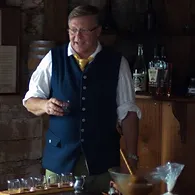Did Early America Have A Drinking Problem?
During the Early Republic era (1780-1830), America’s geographic expansion was rapid. So was the country’s growing thirst for distilled spirits. All of the states produced alcoholic beverages, but Pennsylvania led the nation in the production of whiskey. One county in Pennsylvania, York County, was blessed with fertile fields for abundant harvests of grain and an immigrant population with a strong distilling heritage. Many German and Scots Irish families in the region began distilling early after their arrival in their new land. Bountiful grain harvests allowed production of spirits for sale, not just for consumption. Additionally, the growing transportation network provided routes for wagons to get to new markets. Wagons, filled with barrels of whiskey, departed regularly from the Eichelberger Distillery (see arrow) in York County, Pennsylvania on an eight-day trip to Baltimore, Maryland.

Initially, the distillery was operated by the Dill family, who distilled spirits from 1742 -1800 for their tavern. In 1800, the Eichelberger family took over the tavern, expanded distilling, and introduced a new capability: wagon building. Conestoga wagons were the eighteen wheelers of early America. Easy to navigate roads and these wagons changed the game, as vertical integration of their distilling business was now possible. Not only did they build wagons to haul their own precious, profitable cargo, but records show they stopped to pick up neighbors’ whiskey, for the trip to the thirsty port city. Wagons were not empty on the return trip! Goods from Baltimore, especially oysters (also transported in barrels), filled the wagons on their way home.
Admittedly, better roads and wagons helped the Eichelbergers achieve success, but the timing could not have been better. The nation’s thirst for distilled spirits grew rapidly into the nineteenth century. In fact, from 1795 to 1820, the annual consumption of distilled spirits in gallons increased by two to five gallons. The Eichelberger’s rode the wave of whiskey demand. The distillery that started as a small farm distilling operation, made 8,993 gallons in 1813.

The nation was bathed in whiskey. “Bracers,” “eleveners”, and “four o’clock drams” were provided as rations. Soldiers even received extra whiskey rations for field duty. Understandably, problems arose. Observers, including Dr Benjamin Rush, Revolutionary War surgeon and signer of the Declaration of Independence, promoted “temperance”. He argued in his Moral and Physical Thermometer, or a Scale of Temperance and Intemperance, that morning drams would lead to such things as lying, fighting, swearing, fraud and hatred of a just government. “The only thing worse than having a morning dram was putting pepper in your rum!” His warnings were mostly unheeded as whiskey was a way of life. Even President George Washington began distilling in retirement. Increasing consumption led to even greater criticism, and the Temperance Society grew to national prominence in the 1820’s. Though it took a hundred years, the American Temperance Union allied with the Anti-Saloon League and the Suffrage Movement finally convinced politicians to experiment with a national prohibition on the production, importation, transportation, use, and sale of alcohol. However “use” had loopholes for medicinal, religious and research consumption. The solution to the drinking problem resulted in a new set of problems such as organized crime (bootlegging). The prohibition law went into effect Jan 16, 1920, shortly after midnight. Gangsters in Chicago stole medicinal whiskey and took over the distribution. Thankfully, that experiment ended after thirteen years. While the consumption levels of early Americans appear to be excessive, government solutions were even worse. So, WBSE, drink responsibly!





